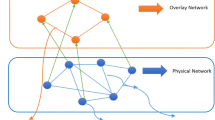Abstract
Resource discovery in structured and unstructured peer-to-peer (P2P) systems have been extensively studied. Surprisingly, most of the systems are not designed to take advantage of node heterogeneity. In this paper, we propose a novel overlay called Rattan, which serves as an underlay for unstructured P2P networks. Rattan exploits the heterogeneity of nodes by structuring capable nodes as the core network of an unstructured P2P system. With Rattan as the underlay, the scope of resource discovery in an unstructured P2P system can be maximal using a minimal number of messages. We evaluated Rattan in simulation. The results show that (1) Rattan is robust by exploiting redundant overlay links, and (2) the maximum bandwidth for protocol processing in a single Rattan overlay is around 1 Mbits/sec, where 80% of nodes merely take 66 Bits/sec. We believe that a desktop machine equipped with an 100 Mbits/sec network interface is capable of processing 1 Mbits/sec of protocol operations. Peers that connect to the overlay via slow access networks, e.g. modems with 56 Kbits/sec, can accommodate the 66 bits/sec of overhead.
Access this chapter
Tax calculation will be finalised at checkout
Purchases are for personal use only
Preview
Unable to display preview. Download preview PDF.
Similar content being viewed by others
References
Ratnasamy, S., Francis, P., Handley, M., Karp, R., Shenker, S.: Ascalable content-addressable network. In: Proceedings of the International Conference on Applications, Technologies, Architectures, and Protocols for Computer Communications, pp. 161–172. ACM Press, New York (2001)
Stoica, I., Morris, R., Karger, D., Kaashoek, M.F., Balakrishnan, H.: Chord:Ascalable peer-topeer lookup service for internet applications. In: Proceedings of the International Conference on Applications, Technologies, Architectures, and Protocols for Computer Communications, pp. 149–160. ACM Press, New York (2001)
Rowstron, A., Druschel, P.: Pastry: Scalable, distributed object location and routing for largescale peer-to-peer systems. In: Guerraoui, R. (ed.) Middleware 2001. LNCS, vol. 2218, pp. 161–172. Springer, Heidelberg (2001)
Hsiao, H.C., King, C.T.: Tornado: A capability-aware peer-to-peer storage overlay. Journal of Parallel and Distributed Computing (2004)
Hsiao, H.C., King, C.T.: Resource Discovery in Peer-to-Peer Infrastructure. In: High Performance Computing: Paradigm and Infrastructure, John Wiley & Sons Ltd., Chichester (2004)
Clarke, I., Miller, S.G., Hong, T.W., Sandberg, O., Wiley, B.: Protecting free expression online with freenet. IEEE Internet Computing 6, 40–49 (2002)
Sen, S., Wang, J.: Analyzing peer-to-peer traffic across large networks. ACM/IEEE Transactions on Networking 12 (2004)
Saroiu, S., Gummadi, P.K., Gribble, S.D.: Measuring and analyzing the characteristics of napster and gnutella hosts. Multimedia Systems 9, 170–184 (2003)
Hsiao, H.C., King, C.T., Gao, S.Y.: Making exploitation of peer heterogeneity as a first class citizen for resource discovery in peer-to-peer networks. Technical report, National Tsing-Hua University, Taiwan (2003)
Ganesan, P., Sun, Q., Garcia-Molina, H.: Yappers:Apeer-to-peer lookup service over arbitrary topology. In: Proceedings of IEEE INFOCOM, pp. 1250–1260 (2003)
Wang, C., Xiao, L., Liu, Y., Zheng, P.: Distributed caching and adaptive search in multilayer p2p networks. In: Proceedings of the International Conference of Distributed Computing Systems, pp. 219–226. IEEE Computer Society, Los Alamitos (2004)
Bhagwan, R., Savage, S., Voelker, G.M.: Understanding availability. In: Proceedings of International Workshop on Peer-to-Peer Systems, Springer Press, Heidelberg (2003)
Author information
Authors and Affiliations
Editor information
Editors and Affiliations
Rights and permissions
Copyright information
© 2004 Springer-Verlag Berlin Heidelberg
About this paper
Cite this paper
Hsiao, HC., King, CT., Gao, SY. (2004). Making Exploitation of Peer Heterogeneity as a First Class Citizen for Resource Discovery in Peer-to-Peer Networks. In: Yang, L.T., Guo, M., Gao, G.R., Jha, N.K. (eds) Embedded and Ubiquitous Computing. EUC 2004. Lecture Notes in Computer Science, vol 3207. Springer, Berlin, Heidelberg. https://doi.org/10.1007/978-3-540-30121-9_91
Download citation
DOI: https://doi.org/10.1007/978-3-540-30121-9_91
Publisher Name: Springer, Berlin, Heidelberg
Print ISBN: 978-3-540-22906-3
Online ISBN: 978-3-540-30121-9
eBook Packages: Springer Book Archive




